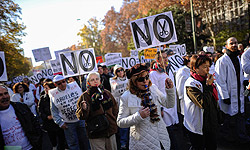
On Sunday, Several thousand people marched to Madrid's central Plaza de Cibeles from 27 hospitals in the region, waving signs that read "Your health is being sold" and "Cutting back on health care is a crime," Bangkok Post reported.
They chanted, blew whistles and beat drums as they made their way through the streets of the Spanish capital, blocking traffic, behind a large banner that read: "Health care is not to be sold, it is to be defended".
"There is no study that shows that privatising the management of hospitals leads to lower costs. This privatisation hurts patients' health care to benefit other interests," said Emilia Becares, a 46-year-old nurse who went to the protest with her three sons, aged seven, eight and nine.
The Madrid regional government plans to outsource the management of six of 20 large public hospitals and 27 health centers of the 270 in the region.
Health care is administered by Spain's 17 semi-autonomous regions rather than by the central government.
Spanish health care workers and many patients, who are fiercely protective of the public health system, say private providers will put profits before quality and fire thousands of support staff in favor of cheaper replacements.
"Many medications are no longer provided for free. I am here to defend the public health care system which we have built up over the years," said Carlos Moreno, a 52-year-old doctor who came to the protest decked out in his lab coat.
The march was part of a series of such demonstrations, dubbed a "white tide" because of the color of the medical scrubs many protesters wear, that have been held since last year.
Thousands of people demonstrated in Barcelona, Spain's second largest city, behind a huge white banner that read: "To defend public health. No privatisation. No budget cuts".
Police estimated around 8,000 people took part in the march. Organisers put the figure at around 50,000.
Smaller protests were held in other Spanish cities including Albacete, Santander, Pamplona and Zaragoza.
Prime Minister Mariano Rajoy's government has slashed health spending by seven billion euros ($9.1 billion) a year as part of a campaign to squeeze 150 billion euros out of the crisis-racked country's budget by 2014.
The government is implementing harsh austerity reforms aimed at avoiding the need for a national bailout like that required by Greece, Portugal, Ireland and Cyprus.
Spain is grappling with a double-dip recession with 26 percent unemployment, having never recovered from a real estate crash in 2008.




































